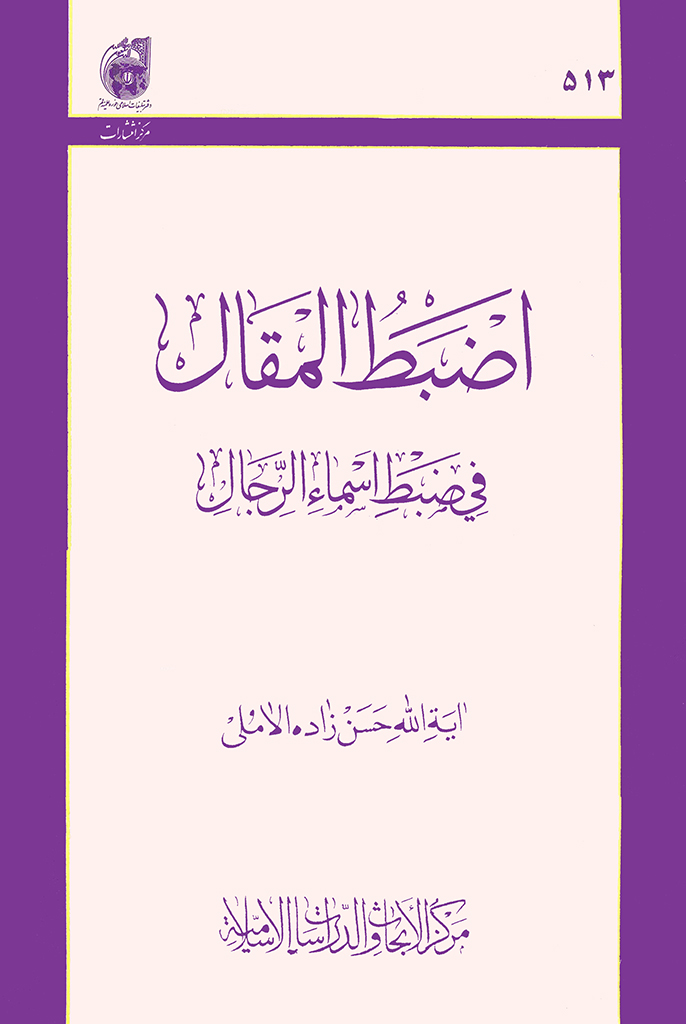The Arabic language is written down largely without indicating diacritical lexical vocalizations (iʽrāb), save in the case of the Holy Quran which has traditionally been recorded with utmost care to prevent any mis-reading. As expected, the same written form of proper names (of people, tribes, places, and religio-social institutions) are apt to be read in different ways. As this causes several problems for readers and scholars who are not well familiar with such pronunciation delicacies, it has been necessary to have a convenient guide at hand. Therefore, it has long been a serious research void to have a pronouncing dictionary of personal, tribal, and place names in Islamic classical texts.
The author, Ayatollah Ḥasan Ḥasanzādih Āmulī (1307-1400 Sh/ 1928-2021), developed it when he was busy with producing a correctly vocalized Arabic version of al-Kāfī of Muḥammad b. Yaʽqūb al-Kulaynī (d. 329 AH/ 940). When the author was asked to prepare a carefully edited and vocalized version of al-Kāfī for its users, he felt it that such a guide would enhance the convenience of such a work. Hence, along with developing a new version of al-Kāfī, he developed the present volume. He accomplished the project in 1388 AH/ 1347 Sh/ 1968.
 Almost three decades passed by until this valuable pronouncing dictionary appeared in its published version. Now, a team of three well-versed clerics, namely Sayyid Kāẓim Mudarrisī, Fāḍil ʽIrfān, and Muḥammad-Kāẓim Maḥmūdī, revised it based on a number of sources: Here is a list of the works they drew upon: Ibn Ḥabīb [d. 245 AH/ 859], Muʼtalaf al-qabāʼil; al-Dārquṭnī [d. 385 AH/ 995], al-Muʼtalaf wa al-mukhtalaf; al-Maghribī [d. 418 AH/ 1027], al-Īnās; al-Samʽānī [d. 562 AH/ 1170], al-Ansāb; Ibn Mākūlā [d. 475 AH/ 1082], al-Ikmāl wa dhuyūlih; Yāqūt al-Ḥamawī [d. 626 AH/ 1228], Muʽjam al-buldān; Ibn Manẓūr [d. 711 AH/ 1311], Lisān al-ʽarab; al-ʽAllāmah al-Ḥillī [d. 726 AH/ 1325], Īḍāḥ al-ishtibāh; al-Zabīdī [d. 1205 AH/ 1790], Tāj al-ʽarūs; and many other works. The point that the three research assistants relied on these sources was simply that they had not been available in print when the author was developing his pronouncing dictionary. Needless to say, they presented their efforts to Ayatollah Ḥasan Ḥasanzādih Āmulī and received his approval.
Almost three decades passed by until this valuable pronouncing dictionary appeared in its published version. Now, a team of three well-versed clerics, namely Sayyid Kāẓim Mudarrisī, Fāḍil ʽIrfān, and Muḥammad-Kāẓim Maḥmūdī, revised it based on a number of sources: Here is a list of the works they drew upon: Ibn Ḥabīb [d. 245 AH/ 859], Muʼtalaf al-qabāʼil; al-Dārquṭnī [d. 385 AH/ 995], al-Muʼtalaf wa al-mukhtalaf; al-Maghribī [d. 418 AH/ 1027], al-Īnās; al-Samʽānī [d. 562 AH/ 1170], al-Ansāb; Ibn Mākūlā [d. 475 AH/ 1082], al-Ikmāl wa dhuyūlih; Yāqūt al-Ḥamawī [d. 626 AH/ 1228], Muʽjam al-buldān; Ibn Manẓūr [d. 711 AH/ 1311], Lisān al-ʽarab; al-ʽAllāmah al-Ḥillī [d. 726 AH/ 1325], Īḍāḥ al-ishtibāh; al-Zabīdī [d. 1205 AH/ 1790], Tāj al-ʽarūs; and many other works. The point that the three research assistants relied on these sources was simply that they had not been available in print when the author was developing his pronouncing dictionary. Needless to say, they presented their efforts to Ayatollah Ḥasan Ḥasanzādih Āmulī and received his approval.
The entries are arranged alphabetically. This is much easier and more convenient particularly with regard to proper names. Also, as non-Arabs may not know the proper tri-consonantal radicals of Arabic words, the alphabetical arrangement, as applied in this work, prove more logical.
The author took great pains in vocalizing all the proper names. The entries contain a few examples with explanations, too. With a view to increasing the user-friendliness or utility of the book for other types of readership, it would be of immense value if the proper names appear in phonetic transcription or at least with proper transliteration. At times, it might be a good idea to provide an English version of it for those users who may probably experience problems with the proper names that share the same Arabic orthographic forms.
In addition to indicating the pronunciation of the proper names, it is necessary to update the geographical explanations indicated. As the author and editors of the book relied on older and medieval sources, certain locations indicated does not match present-day geographical divisions. For example, the Lebanese city Baalbak no longer belongs to Syria. It has long been a city in Lebanon. Other examples are Astarābād which is called Gorgan (Gurgān) in northern Iran, or the southern Lebanese city Sidon (Arabic Ṣaydāʼ) is no longer regarded as a suburb of Damascus (Arabic Dimashq).
The above project would have been expanded and enlarged if the dictionary would include many more entries. The basic work based on which this book has been prepared was al-Kāfī; it would be more desirable and rewarding if a group of experts would have developed the same project based on other Shii classics.
Muhammad-Reza Fakhr-Rohani
University of Qum,
Iran.
